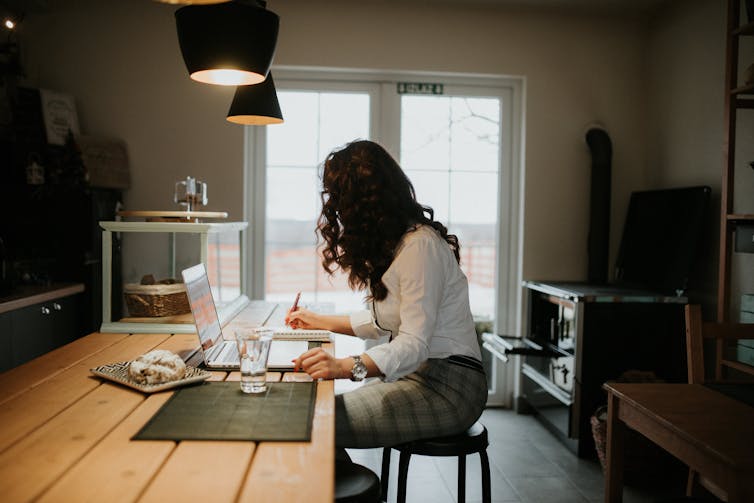some routines not to break if coronavirus means you have to work from home
- Written by Paula Brough, Professor and Director, Social & Organisational Psychology Research Unit, Griffith University
The precautions taken by some employers over the coronavirus mean you may find yourself working from home, some for the first time.
For example, Telstra says[1] it wants any Australian-based office staff who can work from home to do so until the end of the month “at a minimum”. Many other employers[2] are encouraging their staff to do the same.
You might feel this is a chance to stay in pyjamas all day, graze your way through the kitchen cupboards, and balance work tasks with online shopping and social media entries.
Read more: Social distancing can make you lonely. Here's how to stay connected when you're in lockdown[3]
But that won’t help the work get done, and it won’t do much for your sense of well-being. So here are some useful strategies to help if you want to be productive and still feel connected to your workplace over what might be a long working-from-home period.
Work as normal
First prepare yourself for a normal working day. Get up as normal, shower, dress for a casual work day, brush your hair, look as normally presentable as you usually do.
This will put you in your normal work mindset. It will also help if you’re suddenly included in a work meeting via Skype[4], Zoom[5], Facetime[6] or Google Hangouts[7].
Next the physical environment. If you can, have a dedicated work space in a quiet room. It’s really preferable not to work in bed or in your bedroom.
 Try to set a desk at home as you would at work.
Flickr/Nenad Stojkovic, CC BY[8][9]
Try to set a desk at home as you would at work.
Flickr/Nenad Stojkovic, CC BY[8][9]
Set up some desk space similar to your office space at work, aiming to replicate your real work space will also help you achieve that work mindset. Plus you want a neutral background behind you for that work video call.
Use software and apps to help you stay connected, such as Slack[10], Jabber[11] or other similar tools.
Your household data usage will likely increase as you become home-bound. Boost your Wi-fi facilities if you need to – refer to the support offered by your telecom company or internet provider. Some are already offering free upgrades[12] to customers.
Have a plan
Book in daily work meetings via video hook-ups to stay connected and plan work tasks (now you’ll be glad you got out of your PJs!).
You’ll likely still have as much work to do, so plan for a full work day and prioritise your tasks as usual. Make sure you know what is expected of you. Discuss your work tasks with your supervisor as you normally would, it’s important both you and they are clear about your daily work tasks and due dates.
If part of a team, then make sure you know what each member is working on and when their work is due, and follow this up by calls and emails. As always, tell your supervisor of any problems you experience with completing your work.
And remember it’s preferable to discuss any problems via a phone or video call, rather than multiple emails, to better clarify the issues involved.
Read more: It's not just the isolation. Working from home has surprising downsides[13]
It’s also important to look after your psychological health, during what could become long periods of isolation. Your may feel a bit overwhelmed by the directive to work from home, and also anxious about the broader coronavirus situation.
Social contact is very important. If you’re used to having lunch or coffee with colleagues, plan a quick social phone or video call to each other at lunchtime or after you have finished a few hours of work. It’s really important to stay connected with your colleagues as usual and to make sure all feel supported.
Get some fresh air. If you can, have a daily walk to your local shop, or at least get outside in your garden or balcony. Hang out some washing, walk the dog, water a plant, pick some fresh veggies, just take a break from your desk and move around.
Call family, friends and colleagues to see how they’re doing. Stay socially connected.
 Use video technology to stay socially connected with your work colleagues.
Shutterstock/RossHelen
Use video technology to stay socially connected with your work colleagues.
Shutterstock/RossHelen
That work/life balance
It’s also important to think through your work-home boundaries. We’ve become used to blurring these boundaries a little, which is often beneficial, helping us to manage our multiple demands.
But when your home and work are located in the same place, the boundary setting needs some consideration.
Read more: Can I take the dog for a walk? Can I put the kids to bed? What you should and shouldn't do if you're in coronavirus self-isolation[14]
Be aware of home demands interfering with your work. Don’t procrastinate work tasks by first doing some housework. Set yourself a target to complete a work task and when you’ve finished it then spend ten minutes doing the tidying.
Equally, don’t let work take over your home life - just because work is always there doesn’t mean you have to be. Finish about the time you normally would.
Walk away from your desk. Engage with your family and friends. A period of psychological recovery from work is vital to make sure you feel rested and productive for working from home tomorrow.
References
- ^ says (exchange.telstra.com.au)
- ^ other employers (au.finance.yahoo.com)
- ^ Social distancing can make you lonely. Here's how to stay connected when you're in lockdown (theconversation.com)
- ^ Skype (www.skype.com)
- ^ Zoom (zoom.us)
- ^ Facetime (support.apple.com)
- ^ Hangouts (hangouts.google.com)
- ^ Flickr/Nenad Stojkovic (www.flickr.com)
- ^ CC BY (creativecommons.org)
- ^ Slack (slack.com)
- ^ Jabber (www.cisco.com)
- ^ offering free upgrades (www.whistleout.com.au)
- ^ It's not just the isolation. Working from home has surprising downsides (theconversation.com)
- ^ Can I take the dog for a walk? Can I put the kids to bed? What you should and shouldn't do if you're in coronavirus self-isolation (theconversation.com)
Authors: Paula Brough, Professor and Director, Social & Organisational Psychology Research Unit, Griffith University







